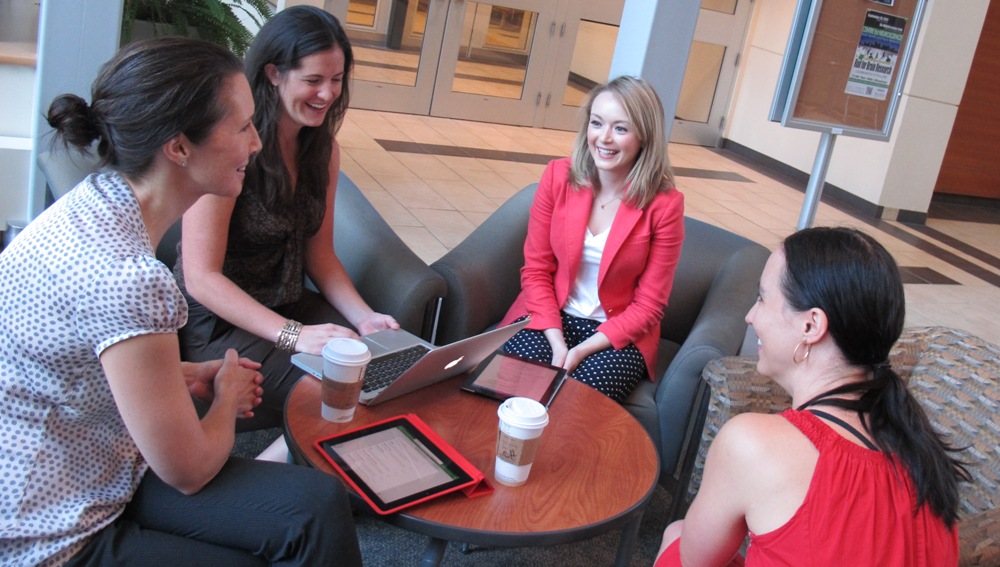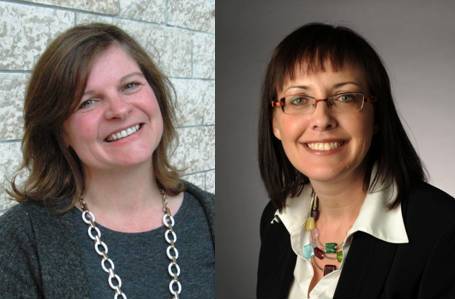
L - R: Kathryn Dong, Katherine Smith, Alli Kirkham and Ginetta Salvalaggio
Two humanism projects at the Faculty of Medicine & Dentistry have received funding from the Arnold P. Gold Foundation Research Institute.
Humanism in the inner city
Kathryn Dong, associate clinical professor in emergency medicine, is the principal investigator for a project that will examine the practices of teaching inner city health to medical trainees. Co-investigators include fourth-year emergency medicine residents Alli Kirkham and Katherine Smith, and Ginette Salvalaggio, an assistant professor in family medicine.
Inner city health is concerned with services and treatment options available to marginalized groups within urban areas. Patients often struggle with housing or homelessness, substance use, poverty, participation in the survival sex trade, certain infectious diseases and other health problems associated with high-risk lifestyles.
"Part of what we have to accomplish is to break down the cultural barriers between medical students and these patient populations." Smith said, noting that lack of interaction can cause medical students to feel uncomfortable with inner city patient populations.
Medical students are often introduced to inner city health indicators as individual characteristics, potentially causing them to identify patients solely by their predominant afflictions. A homeless patient, for example, may also have a history of sexual abuse, poverty or addiction which are closely linked to the primary characteristic of homelessness identified by the student.
"The whole purpose of this review and of teaching inner city health is not to identify specific areas that are more important than others. It's more about meeting the whole person who may have a multitude of issues, and identifying what approaches are best for that individual," Kirkham said.
"If we sit here applying band-aids to downstream diseases or illness process, we're missing the boat," Salvalaggio said of the group's motivation to reconsider the delivery of inner city health education.
Dong, Salvalaggio, Smith and Kirkham worked with a health sciences librarian to develop a list of search terms that identify the concepts of inner city health. Using these terms, they will gather all available teaching and curricular resources and analyze the information to develop an Edmonton-specific undergraduate curriculum for inner city health.
Some of the anticipated challenges include: bias in control groups, bias of language in reference to inner city patients and scarcity of literature encompassing all components of inner city health.
Technology to teach humanism
Pamela Brett-MacLean, director of the Arts & Humanities in Health & Medicine program, is the principal investigator for the second Faculty project to receive funding from the Arnold P. Gold Foundation. Brett-MacLean and her team will examine digital approaches to teaching humanism in medicine. Co-investigators from the U of A include Tracey Hillier, associate dean of curriculum for the undergraduate medical program, and Clair Birkman, information specialist health sciences librarian. Johanna Shapiro from the University of California at Irvine and Tom Rosenal from the University of Calgary are also co-investigators.
Humanism, in reference to medicine, is a broad topic encompassing all matters related to respectful and compassionate doctor-patient relationships. It emphasizes the respect and empathy required to remember that a patient is a person with emotions, life experiences and a family rather than simply an illness.
"We are trying to get more creative in the use of digital approaches to student learning. Why? Because this is how they're living. This is the air they're breathing," Brett-MacLean said. "E-learning technologies provide 'anytime, anywhere' convenience that can help enhance learners' interactions with information and resources for self-directed and collaborative learning. E-learning is increasingly recognized as having an important role in the future of education, and we want to most effectively use all of the resources that are available."
With Birkman's expertise, the group will gather literature referencing best-practice approaches to online medical humanities teaching. The scoping review will include materials produced after 1992, when web-based approaches to medical education first appeared in literature.
Although humanism in medicine already has a strong presence at the U of A, Brett-MacLean and Hillier look forward to integrating their results into future curriculum such as the new physicianship course. In this course, students have been matched with volunteer patients with chronic illness and will meet with them several times, including accompanying them to a doctor's appointment as an observer. At the end of the two-year course, each student will create an interpretive artwork that reflects the insights and understanding they experienced through their volunteers. Online medical humanities resources will also be available to supplement other curriculum content. Brett-MacLean and Hillier hope to share the final products in a physical and digital gallery to foster the development of humanistic sensitivities and sensibilities of learners within the medical program.
"The available technologies, they change so quickly. We're going to have to evolve," Hillier said. "Right now, our conception of what is going to be the best way of doing it is probably a lot flatter than what it will be like a year from now."
A total of 24 projects received funding from the Arnold P. Gold Foundation's Rigorous Reviews of Research on Humanism in Healthcare Grant. The Arnold P. Gold Foundation is a not-for-profit organization dedicated to the advancement of humanism in medicine by emphasizing attitudes and behaviours that promote empathy, compassion and service. The research institute was established in 2012 to help advance the foundation's vision by funding research projects that improve understanding of the human condition as it relates to the delivery of medicine.
